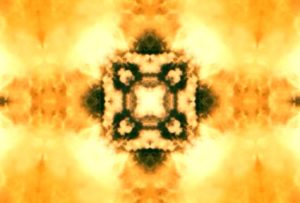The discrepancy is right there, how could anyone miss it?! In the first creation account, Genesis 1, it states that vegetation was created on the third day and man was created on the sixth day.
“And God said, “Let the earth sprout vegetation, plants yielding seed, and fruit trees bearing fruit in which is their seed, each according to its kind, on the earth.” And it was so … And there was evening and there was morning, the third day.” (Genesis 1:11-13, ESV)
“Then God said, “Let us make man in our image, after our likeness … And God saw everything that he had made, and behold, it was very good. And there was evening and there was morning, the sixth day.” (Genesis 1:26-31, ESV)
However, in the second creation account, Genesis 2, the text says that before vegetation was created man was formed.
“When no bush of the field was yet in the land and no small plant of the field had yet sprung up—for the Lord God had not caused it to rain on the land, and there was no man to work the ground, and a mist was going up from the land and was watering the whole face of the ground— then the Lord God formed the man of dust from the ground and breathed into his nostrils the breath of life, and the man became a living creature.” (Genesis 2:5–7, ESV)
How does this make sense? How is this reconciled?
As western thinkers we like things to line up perfectly, it makes us uncomfortable when they don’t. However, Hebrew writers and hearers were not as concerned about that as we are. They are more interested in the weight of the text and how it illuminates God’s eternal truth and challenges the soul. Rather than trying to remove all the tensions of the text, there is incredible value in wrestling with the tension.
Jewish teachers have dealt with the tension of the Genesis 1 and 2 for centuries. Rashi, a medieval French Rabbi, thought that on the third day God created everything necessary for vegetation. However, it wasn’t until God created Adam, who saw the need and was able to pray for rain, that vegetation broke through the soil. He points out that God craves the prayers of his people. In other words, God’s creation is formed in such a way that God’s people play a role in bringing forth that which God intends.
This idea is echoed throughout Scripture. When Jesus teaches his disciples to pray he instructs them to pray, “Your Kingdom come, your will be one, on earth as it is in heaven” (Matt. 6:9-15). When Jesus sees the a lack of laborers for the Kingdom, he instructs his disciples to “pray earnestly to the Lord of the harvest to send out laborers” (Luke 10:2). Again, in Revelation the author tells us “the prayers of the saints” (Rev. 4-5) brought about the culmination of the world.
You and I, through prayer, play a role in bringing forth the Kingdom of God to earth!
Prayer drove Jesus’ ministry (Mark 1:35-39). Jesus model prayer and taught prayer. After teaching extensively on the coming of the Kingdom of God, Jesus tells the parable of the persistent widow (Luke 18:1-8). In this parable Jesus likens our prayer life to a widow seeking justice from a corrupt judge. The judge eventually gives into her request just to silence her. The point is that if a corrupt judge gives justice, how much more will God, who is good and loving, bring forth his Kingdom. Keep praying, don’t lose heart.
The disciples were confronted (and probably embarrassed) with the role of prayer and bringing forth the Kingdom. It was an extraordinary event: a desperate father, the disciples, and Jesus (Mark 9:14-29). The father’s son was possessed by a demon. He asked Jesus’ disciples to cast out the demon and they could not. Enter Jesus. The father, the disciples, and crowd that had gathered, saw Jesus approaching and ran out to greet him. The father pleaded with Jesus to do something. It’s a fascinating dialogue where in the end Jesus casts out the demon with authority. Later, the disciples ask Jesus why they could not cast it out. Jesus tells them “This kind cannot be driven out by anything but prayer” (Mark 9:29), implying that whatever it was they were doing before he arrived was pointless because they were not praying.
How often my desire to be persistent in my prayers like the widow and yet find myself more like the disciples!
Perhaps the reason we don’t pray is because the prayers we do pray are boring and safe. We pray for comfort and happiness. We may never preach health and wealth, but we certainly pray for health and wealth.
When the church was just beginning after the resurrection they experienced intense persecution. Instead of praying to be removed from the persecution, instead of praying to be comfortable, the church asked God for boldness in the face of persecution (Acts 4:23-31).
The early church understood that prayer moves the hand of God, specifically to bring for the Kingdom of God on earth. Pray boldly. And when you pray boldly, you will find your prayer life rejuvenated and vibrant.
Here are two of my bold prayers:
Jesus, let me see people the way you see people, let me forgive the way you forgive.
Jesus, I surrender to you. I will go where you want me to go and I will do what you want me to do.
What are your bold prayers?
